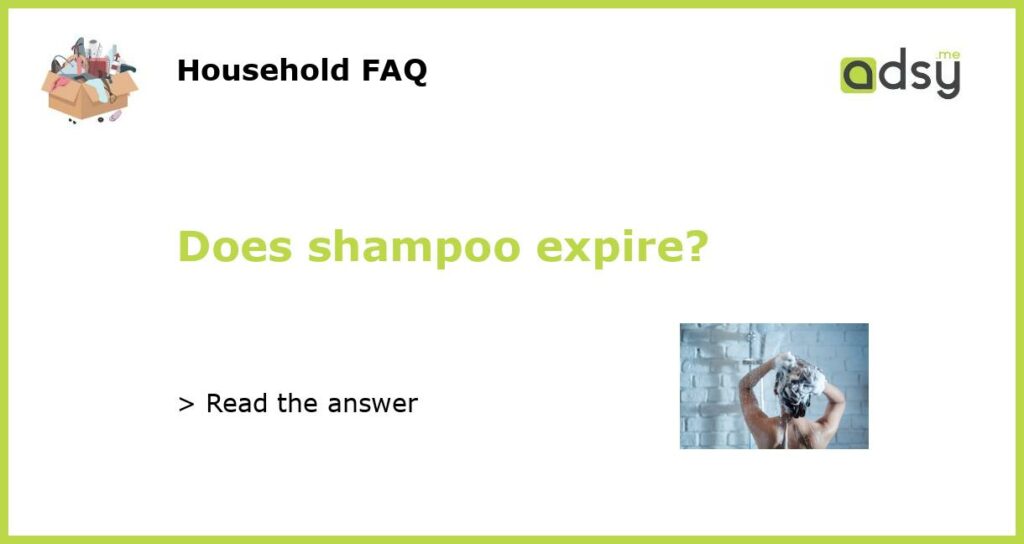Shampoo Expiration: Here’s What You Need to Know
Shampoo is a common staple in most people’s bathrooms, used daily or a few times a week to clean and nourish the hair. But what happens when you come across an old bottle of shampoo at the back of your cabinet? Does shampoo expire? The short answer is yes, shampoo can expire, and it’s important to know the signs of an expired shampoo to ensure its effectiveness and safety. In this article, we’ll explore the reasons why shampoo expires, how to tell if your shampoo has expired, and how to properly store your shampoo to maximize its shelf life.
Understanding the Shelf Life of Shampoo
Shampoo, like any other personal care product, has a shelf life. The average shelf life of most shampoos is typically between two to three years from the date it was manufactured. This expiration date is determined by several factors, including the ingredients used, the manufacturing process, and any preservatives added to the formulation.
Over time, the effectiveness of the active ingredients in shampoo can diminish, making it less effective in cleaning and nourishing the hair. Additionally, the preservatives that are added to prevent bacterial and fungal growth may lose their efficacy, increasing the risk of contamination.
Signs of an Expired Shampoo
While shampoo doesn’t typically go bad in the same way that food does, there are some signs to look out for to determine if your shampoo has expired:
- Change in Color or Consistency: If your shampoo has changed color or consistency, it may be an indication that it has expired. For example, a shampoo that has turned yellow or has developed clumps may no longer be safe to use.
- Unpleasant Odor: An expired shampoo may develop a foul or rancid smell. If your shampoo smells off or different from when you first purchased it, it’s time to throw it away.
- Lack of Lather: Shampoos that have expired may produce less or no lather at all when mixed with water. This can be a sign that the surfactants in the shampoo have lost their effectiveness.
- Skin Irritation: Using an expired shampoo can lead to skin irritation, redness, or itching. If you notice any adverse reactions after using your shampoo, it’s best to discontinue use.
Proper Storage to Maximize Shelf Life
To extend the shelf life of your shampoo and ensure its efficacy, it’s essential to store it properly:
- Avoid Exposure to Heat: Heat can accelerate the degradation of ingredients in shampoo. Store your shampoo in a cool and dry place away from direct sunlight and sources of heat, such as radiators or heaters.
- Keep the Container Sealed: Exposure to air can promote the growth of bacteria and fungi in the shampoo. Always tightly seal the bottle after each use to minimize air exposure.
- Check for Changes Regularly: Make it a habit to inspect your shampoo for any changes in color, odor, or consistency. If you notice any signs of expiration, it’s time to replace it.
Safely Disposing of Expired Shampoo
When it’s time to get rid of your expired shampoo, it’s important to do so safely and responsibly:
- Recycle the Bottle: If the bottle is recyclable, rinse it out and discard it in the appropriate recycling bin.
- Dispose of in the Trash: If the bottle cannot be recycled, throw it in the trash. Make sure to seal the bottle in a bag or wrap it in newspaper to prevent leakage.
- Avoid Pouring Down the Drain: Do not pour expired shampoo down the drain, as it can contribute to water pollution. Dispose of it in solid waste instead.
Knowing the expiration date of your shampoo and being aware of the signs of an expired product can help you maintain healthy and effective haircare. By storing your shampoo properly and disposing of it responsibly, you can ensure you’re getting the most out of your daily haircare routine.






